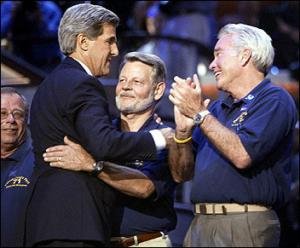July 30, 2004
Reality TV vs. Democracy: DNC Media Coverage

LA Times media columnist Tim Rutten suggested that prime time TV networks should cover the Democratic National Convention a bit more than they're doing, and do a little less reality TV:
-
The most serious problem confronting the American news media today is neither creeping political bias nor the tensions between new and old technologies. Those topics may obsess media critics, but their significance pales alongside the greater issue, which is corporate managers' growing inability to distinguish between the public's interest — fascination with entertainment and celebrity - and the public interest - a deference to the common good.
The situation with this week's Democratic National Convention in Boston is a window on what this failure of discernment may imply for the future of the mainstream press. It is difficult, of course, to argue that any event attended by 15,000 journalists is in any sense under-covered. But an ever-growing number of those journalists are employed by newspapers, magazines, and radio and television stations whose ever-smaller number of corporate owners expect them to function first and foremost as "business units."
This process of acculturation is most advanced among the three broadcast networks — ABC, a Disney property; CBS, which belongs to Viacom; and NBC, a division of General Electric. Their combined audience of almost 30 million is vastly larger than that of any other broadcast outlet, and, unlike cable subscribers, they receive their broadcasts free.
How much convention coverage are they providing?
An hour a night - over three of four nights.
Jim Lehrer, the public television anchor, put the situation precisely at a preconvention panel at Harvard on Sunday. "We're about to elect a president of the United States at a time when we have young people dying in our name overseas," he said. "We just had a report from the 9/11 commission which says we are not safe as a nation, and one of these two groups of people [Democrats or Republicans] is going to run our country. The fact that you three networks decided it was not important enough to run in prime time, the message that gives the American people is huge."
So too were the sentiments conveyed by the three network anchors in an extraordinary series of interviews with the New York Times.
ABC's Peter Jennings spoke of his frustration with his network's truncated broadcasts. "This is clear to my bosses, it's clear to my colleagues; I think you'll find the same thing in every [network] newsroom. Could we, should we be doing more than one hour a night in prime time? The answer is yes."
Dan Rather of CBS wearily recalled how his opposition to network cutbacks began a decade ago, when management began scaling back the coverage. "I argued the conventions were part of the dance of democracy and that rituals are important and that they remained an important ritual," he told the Times. "I found myself increasingly like the Mohicans, forced farther and farther back into the wilderness and eventually eliminated."
NBC's Tom Brokaw requested more time from his overseers and was turned down. "This is why God invented cable," he said. "People who want to watch long-form convention coverage have got a place to do it."
So, if you were one of the millions of viewers this week treated to worm munching (NBC's Fear Factor), vomiting (CBS's Big Brother 5) and liposuction (ABC's Extreme Makeover) instead of primetime convention coverage from Boston's Fleet Center, I don't know that you can blame TV if you don't get out and vote.
- Arik
Posted by Arik Johnson at July 30, 2004 09:44 AM | TrackBack "Competitive Intelligence applies the lessons of competition and principles of intelligence to the need for every business to gain awareness and predictability of market risk and opportunity. By doing so, CI has the power to transform an enterprise from also-ran into a real winner, with agility enough to create and maintain sustainable competitive advantage."
"Competitive Intelligence applies the lessons of competition and principles of intelligence to the need for every business to gain awareness and predictability of market risk and opportunity. By doing so, CI has the power to transform an enterprise from also-ran into a real winner, with agility enough to create and maintain sustainable competitive advantage."
